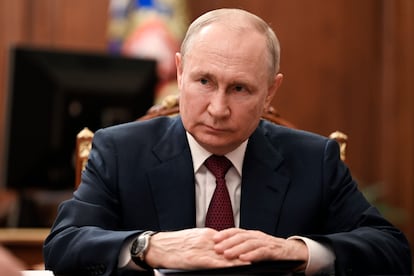What next after Putin?
The Wagner militias’ uprising has torn the veil and broken the power vertical. The president now appears to be weak and fragile, a discredited loser, fodder for a coup d’état, and even an assassination

The Wagner group has been disbanded and its leader exiled, but the first measure after the mutiny was to provide tanks and heavy artillery to the Russian National Guard, the dreaded Rosgvardia, which depends exclusively on Putin and protects borders, institutions and strategic facilities. No one is unaware of the fate that awaits Yevgeny Prigozhin, who gambled everything and lost everything on a single card. If he truly had power within his grasp, which many doubt, it is now he who is within the grasp of power.
And what fate awaits Putin? The danger has not passed for him, and it is demonstrated by the sudden reinforcement of the presidential army, a contingent of almost 400,000 men who are not answerable to the Ministries of the Interior or Defense. The Wagner militia’s uprising has torn the veil and broken the power vertical. The president now appears to be weak and fragile, a discredited loser and fodder for ambitions of succession, a coup d’état, and even an assassination. In his decadent regime, contrary to the advice of war philosophers since Machiavelli, there is a proliferation of mafia-run private militias overlapping with the armed forces.
If Putin launched the aggression against Ukraine from the force of his omnipotent power, the failure of the invasion has stripped him naked. The price on his head is the subject of speculation. On the part of those who are thinking of replacing him, one of the siloviki, the former KGB agents who make up the power elite; but also, on the part of the international diplomacy on both sides, which evaluates the counterparts necessary for a peace negotiation.
Two 2024 presidential elections are on the agenda, the Russian Federation in March and the United States in November. The first is an opportunity to use Putin as a bargaining chip at a negotiating table. He could renounce to run again, either voluntarily or by force. He could suffer a mishap. Or a blow like the one Prigozhin tried to deal him two weeks ago, even if he did not point the finger directly at the president. The second marks the limit for NATO to hold out: the war had better be over by that date just in case Trump or someone like him gets into the White House.
In response to this timetable, Zelenskiy has a strategy for a ceasefire to be agreed before the end of the year, although he will only be able to deploy it if he has first recovered at least a significant part of the territory in Russian hands, as revealed by The Washington Post and not denied by the Ukrainian government. Their discussion has apparently been the focus of a recent trip to Kyiv by CIA chief William Burns, the top specialist in U.S. diplomacy back channels, a former ambassador to Moscow, and someone who has previously conducted notable negotiations with the Taliban and the Iranians.
Sign up for our weekly newsletter to get more English-language news coverage from EL PAÍS USA Edition
Tu suscripción se está usando en otro dispositivo
¿Quieres añadir otro usuario a tu suscripción?
Si continúas leyendo en este dispositivo, no se podrá leer en el otro.
FlechaTu suscripción se está usando en otro dispositivo y solo puedes acceder a EL PAÍS desde un dispositivo a la vez.
Si quieres compartir tu cuenta, cambia tu suscripción a la modalidad Premium, así podrás añadir otro usuario. Cada uno accederá con su propia cuenta de email, lo que os permitirá personalizar vuestra experiencia en EL PAÍS.
¿Tienes una suscripción de empresa? Accede aquí para contratar más cuentas.
En el caso de no saber quién está usando tu cuenta, te recomendamos cambiar tu contraseña aquí.
Si decides continuar compartiendo tu cuenta, este mensaje se mostrará en tu dispositivo y en el de la otra persona que está usando tu cuenta de forma indefinida, afectando a tu experiencia de lectura. Puedes consultar aquí los términos y condiciones de la suscripción digital.









































